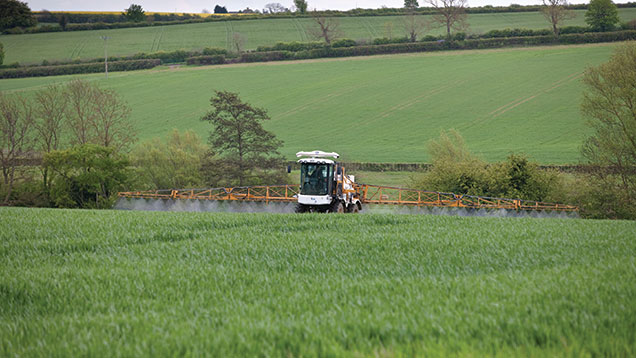Prolific product pipeline bears fruit for Aussie agrochem firm
 © Tim Scrivener
© Tim Scrivener Agrochemical company Nufarm aims to bring two or three pesticide products to market each year over the next five years to help UK farmers keep on top of problem weeds, diseases and pests.
The first flurry of new products available for 2015 includes herbicides Kyleo, Cyclops and Maya, along with just-approved fusarium-fighting azole fungicide formulation Soleil.
See also: Expert formulas for the perfect fungicide programme
Glyphosate and 2,4-D formulation Kyleo offers improved pre-planting knockdown of problem weeds in stubbles, such as oilseed rape volunteers and annual nettles.
Nufarm in numbers
- 1956 – its founding year in Melbourne, Australia
- $2.6bn – global turnover in Australian dollars
- Eighth position in global agrochemical top 10
- €400m – European turnover
- Three production facilities in Europe
- Seventh position in UK agrochemical top 10
- 30,000t of phenoxy herbicides produced at UK factory at Wyke, Yorkshire
In addition, bromoxynil formulations Cyclops and Maya will give cereal growers options for controlling broad-leaved weeds in the autumn and spring and Maya also has an approval in linseed – a crop with few weed control options.
With ALS herbicide resistance now present in poppy, chickweed and mayweed, they can offer resistance-busting alternatives to popular sulfonylurea products.
The Australian company’s main strength is in herbicides, which represent about 65% of its global sales revenue and 78% of sales in the UK marketplace.
However, it is looking to increase its presence in the fungicide market, with Soleil available in the UK this season, containing azoles tebuconazole and bromuconazole.
According to the company it will be strong on rusts and fusarium and offers a cost effective alternative to other commonly used products applied to wheat at the T3 flowering timing.
John Austin, Nufarm’s business manager for Northern Europe, explained that these products are the tip of the iceberg and just four of about 16 products that the company hopes to launch in Europe in the next five years or so.
“We are focussing on cereals, maize, grassland, specialist crop and non-crop markets, but also aim to enter the seed treatment market and an imidocloprid-based cereal seed treatment will hopefully approved in the next 18-24 months to compete with market leader Redigo Deter.
“The future is in mixtures and novel formulations that add value and help farmers meet their challenges,” added Mr Austin.
The company is also gathering data necessary to bring chlorotoluron herbicide products back to the UK market and will help in controlling resistant grassweeds.
New molecules
Nufarm is the eighth largest agrochemical manufacturer in the world, with a turnover of AUD$2.6bn.
European sales are in excess of €400m – equating to a 3% share of the European market and the aim is for that to rise to 5% by 2020, with the UK seen as a key market in achieving its target.
Actives
- Cyclops – bromoxynil + diflufenican
- Kyleo – glyphosate + 2,4-D
- Maya – bromoxynil
- Soleil – tebuconazole + bromuconazole
It sits behind Dow AgroSciences, DuPont and Adama in the UK, but hopes its planned pipeline will propel them into fourth spot behind the big three of Syngenta, Bayer and BASF.
Although company’s revenue has been built on post-patent chemistry, Nufarm Europe’s executive general manager Hugo Schweers explained that collaboration with Japanese research and development company Sumitomo – which own a 23% share in Nufarm – will give them access to new chemical molecules.
“In 2011, 77% of the global crop protection sales were post-patent, so that is what’s driving the market and where, as a company, we are strong,” said Mr Schweer.
“But Sumitomo is driving our R&D and will bring new molecules and new formulations through that we will be able to offer farmers in Europe.”
European director for agricultural business Yvonnick Jambon said that this would enable Nufarm to move away from quality generics, and become an “added value” player.
“Nufarm aims to evolve and go beyond where we currently sit. We will still stick to the core post-patent products that are our strength, but also want to grow into new markets,” said Mr Jambon.
Local supply
The company has three production facilities in Europe at Linz, Austria; Gaillon, France and is expanding its production facility at Wyke, near Bradford, Yorkshire.
It is the biggest producer of phenoxy herbicides such as MCPA and 2,4-D and second in glyphosate globally, but is increasing its ability to produce other chemical groups such as fungicides and insecticides close to the market where they will be used.
“We are producing local products for a local market,” added Mr Schweer.


